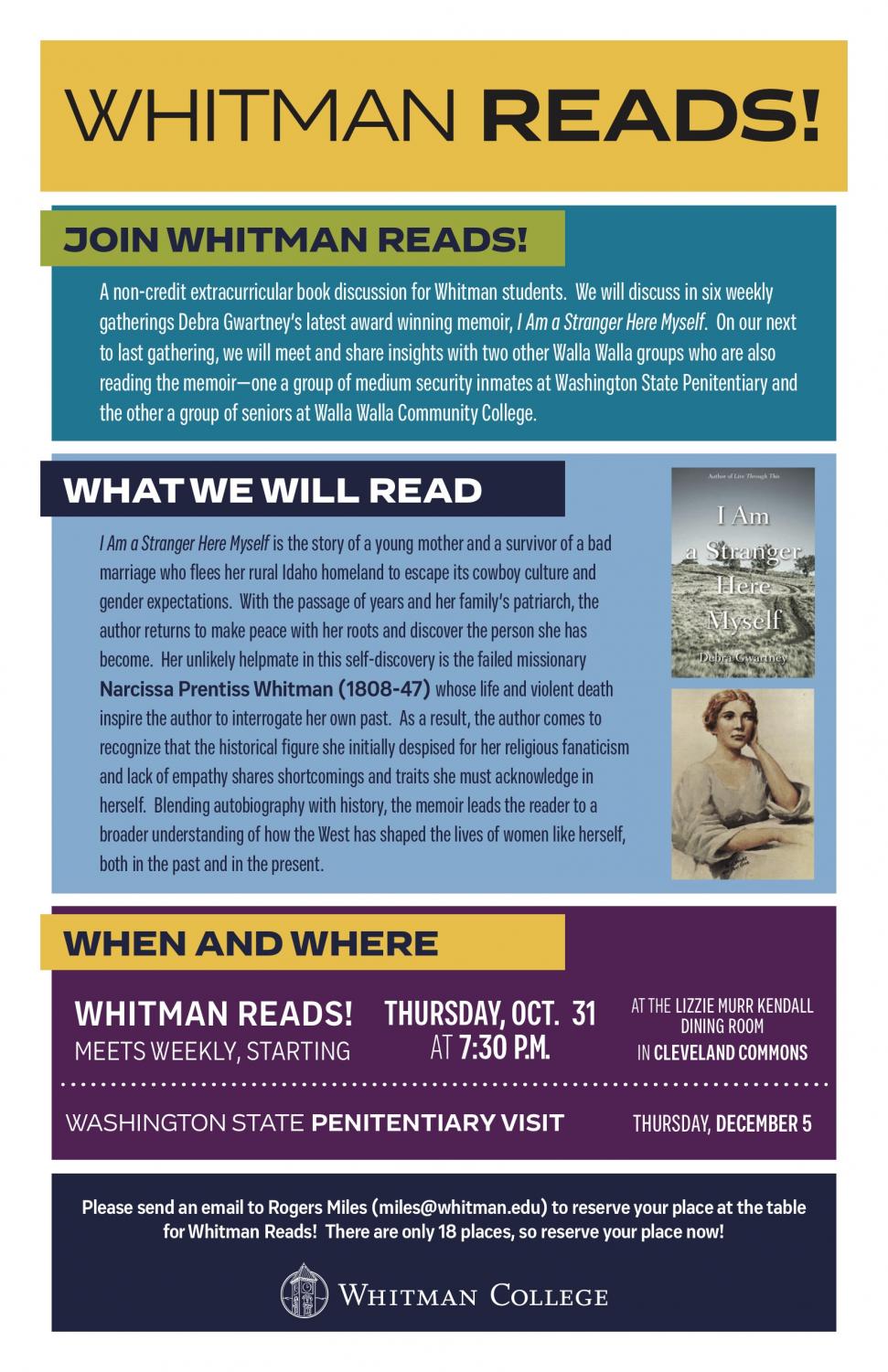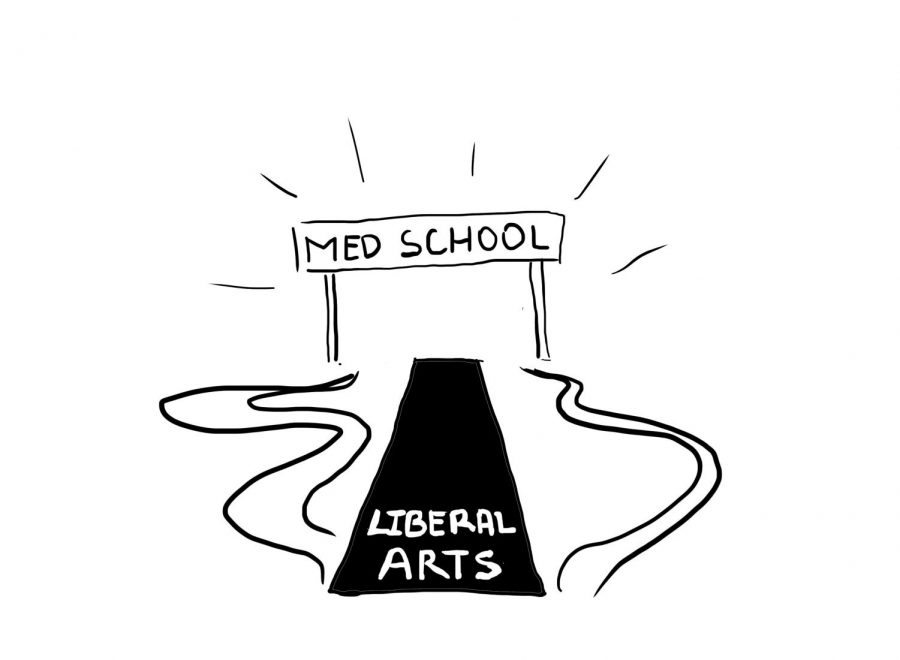Liberal arts offers nontraditional paths to medical school
October 24, 2019
With a high demand in the job market for students with STEM (science, technology, engineering and math) degrees, there is a looming concern whether a liberal arts education is sufficient.
Liberal arts is the exploration of matters not related to vocational, professional or technical curriculums.
What does receiving a liberal arts education mean for a student who wants to head down the pre-med track to be able to attend medical school and become a pediatrician?
This past week, I sat down with students and faculty interested in health professions to find out.
Kimberly Mueller, Director of Health Professions Advising, has been advising students who want to be health professionals for the past 19 years. Five of those years have been at Whitman. She has seen students from all walks of life enter Whitman as first-years and blossom into seniors with plans to continue their education at medical school.
“The first bit of information that needs to be corrected is that students don’t need major in a science,” Mueller said. “Anyone can pursue a health profession.”
Mueller has students come into her office at different points in their education, and keeps at the ready documents listing the core competencies a student should have to be a great candidate for medical school. According to the Association of American Medical Colleges (AAMC), a core competency is “an observable behavior that combines knowledge, skills, values, and attitudes related to a specific activity.” These competencies fall into four categories: Interpersonal, Intrapersonal, Thinking and Reasoning and Science.
“[Medical schools] are looking at a student who is coming in with those core competencies. They are identifying what the students’ experience was, how they engaged with their communities and you can see how all of this builds together in a liberal arts space,” Mueller said. “The role that a liberal arts education plays is so crucial in a student’s development because of the different lenses that students use to analyze issues.”

Junior sociology major Ellie Hough found Whitman after looking for a school where they could study a variety of subjects before applying to medical school.
As a result, liberal arts students end up leaving college as well-rounded individuals who are passionate about understanding the ever-changing world.
“I have never heard of any challenges that a liberal arts education poses for students,” Mueller said.
Ellie Hough, a junior sociology major and chemistry minor, believes that the liberal arts education has not hindered her goal of applying to medical school.
“Ultimately I did decide to become a sociology major so I could explore other disciplines,” Hough said. “At the end of the day if medicine is not what I wanted to do there was some other discipline that would provide me with other job opportunities that I would probably see myself doing compared to a research-based job.”
She explained that when looking for colleges, she was interested in finding a school that would allow her the freedom to study a range of subjects.
“When I was looking at colleges, I really wanted a school where I could study whatever I wanted to,” Hough said. “At the end of the day, pre-med is not a major. You have to major in something else.”
When talking about how Hough’s liberal arts education has benefited her, she brings up a recent summer internship that was made possible by the Whitman Internship Grant. She recently interned for an organization in rural Alabama called Project Horseshoe Farm. Project Horseshoe Farm is run entirely by post-graduate students who are doing a fellowship year. The organization seeks to address the psychosocial aspects of health in under-resourced communities. She notes that her study of sociology gave her a more well-rounded perspective going into the internship.
“For me, I interviewed well and that was due mostly to my sociology background. I was able to think more critically about why these health disparities exist compared to looking at a possible diagnosis and corresponding medication,” Hough said. “It gave me the opportunity to think holistically about the problems being presented.”
Hough has also found that a liberal arts education takes some of the pressure off of applying to medical school and with the collaborative environment at Whitman, people are always around to provide support. She recalls a conversation with her friend who attends Cornell University.
“She told me that people would rip pages from the textbook just so they could hurt other students’ performance, and that has never happened here and definitely hasn’t crossed my mind,” Hough said. “Whitman has created an environment that is very collaborative, and that is good because in any career you enter, you are collaborating.”
However, Hough identified some challenges of being at a liberal arts college. Required distribution classes were one of those points of tension.
“Liberal arts can be challenging because you want to be the creator of your own education,” Hough said. “Taking distribution classes, which I do see value in, doesn’t allow me to really delve into just one thing completely. I am finding that I haven’t taken a lot of classes with professors I enjoy in one discipline. So, the liberal arts do provide some balance, but you do get bogged down with distribution.”
With a tennis racket in her backpack, Hough makes sure to find a balance between academics, fitness and her extracurricular activities. She has found comfort in Whitman where she does not feel pressured to check-off any pre-med boxes. This feeling leaves her able to do things that are seemingly unrelated to pre-med, yet still intersect with gaining experience in the core competencies. For example, Hough is a GLEAN leader. GLEAN goes to farms and harvests leftover produce to donate to food banks in the area. In addition, Hough is also an English language tutor in the Walla Walla community, using her Spanish to address a need in the area. These extracurricular activities that Hough is a part of are essential to curating the experiences that are not only helpful for medical school applications, but for personal enjoyment as well.
“[I] want to focus on being present at Whitman, my experiences, and creating meaningful relationships with my professors,” Hough said.
Nikki Delgado, a senior Psychology major, sat down with me to speak about her experience being a student interested in medical school at a liberal arts college.
“When I first started applying to colleges in high school, I did not know what I wanted to do. So, I applied to a lot of bigger schools because I thought that was the college experience,” Delgado said. “I mostly applied to a lot of research institutions with research opportunities because I knew I wanted to go the pre-med route.

Senior psychology major Nikki Delgado
”
When Delgado’s high school English teacher recommended Whitman, her decision was altered. Falling in love with the campus and the people, she couldn’t see herself going anywhere else.
“I needed a smaller school and I liked the idea of the small faculty to student ratio. I appreciate how all the professors are very supportive and collaborative,” Delgado said. “At bigger schools, it isn’t like that. I didn’t like the idea of being in class with 500 students or even 200 students.”
Even though she was worried about attending Whitman because it isn’t a research-intensive university, she now finds value in a liberal arts education. She has even found opportunities for research in the psychology department under Professor Tom Armstrong.
“The liberal arts education is important because we all get to experience a broad range of disciplines and it gives you a different set of skills that I would not have gotten had I gone to a research university,” Delgado said. “All of my non-natural science courses have challenged me because I have had to participate in discussions and think in a different way compared to being in a natural science class.”
Though Delgado has secured a research opportunity in the psychology department, she does recognize that there are some challenges to being at a liberal arts school.
“A big challenge [at Whitman] is just limited research opportunities,” Delgado said. “I think research opportunities in the science building are very limiting, compared to if you went to a bigger school or a more research-focused school.”
Another limitation of the pre-med track at Whitman, according to Delgado, is the lack of ties to local hospitals, a connection that many larger research institutions have.
“We don’t have a hospital we are affiliated with that a lot of public universities have. The hospital nearby, Providence St. Mary, doesn’t have many student volunteers there. Whitman is not involved with the hospital at all,” Delgado said. “I find that to be limiting because exposure to the healthcare field is important especially if you are on the pre-med track.”
But luckily for Delgado, Hough and other Whitman students, there are many opportunities to get involved if pre-med is an interest. For example, there are shadowing opportunities and many clubs such as Pre-Health Society, Pre-Vet Med Club, Minority Association of Pre-Med Students and a Pre-Physical and Occupational Therapy Club that Mueller advises.
Delgado has a special place in her heart for the Minority Association of Pre-Med Students and the Pre-Health Society.
“Pre-Health Society is a community of students interested in health professions where we provide opportunities, information and a support network for students,” Delgado said. “We talk about pathways to different health professions or we talk about hot topics, which are current medical events happening.”
Whitman may not be a research-intensive institution, but it does provide its students with a liberal arts education that can help them excel, not only in their chosen discipline, but also beyond.
“You have to create the experiences that you want to have, and Whitman has been helpful in providing an environment that helps me seek out those experiences,” Hough said. “What you do and what you think is reflected in your education; liberal arts will give you those skills.”





